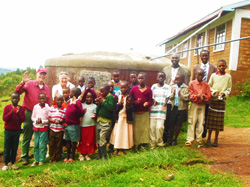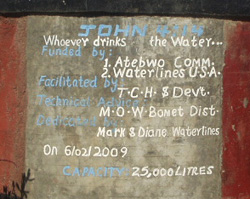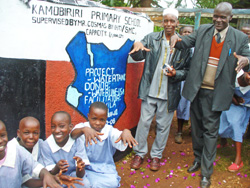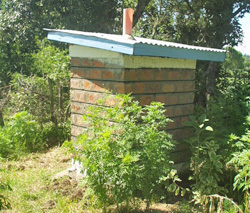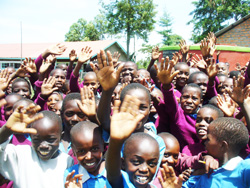How Waterlines works in...Kenya
In the late 1990’s, Linda Golden, a long-time friend of Waterlines teaching at Kenya’s Longisa High School, along with several Peace Corps volunteers in the area, became active in spring protection and rainwater harvesting programs. Waterlines’ work began with water projects for women’s self-help groups. Then at the request of many communities, it expanded to provide rainwater collection tanks for churches, health clinics, and schools.
As the program grew, Waterlines identified four Kenyans–Joel Mitei, Richard Kalya, Davila Langat, and David Kurgat–to act as facilitators to explain the Waterlines program, receive and review applications, and communicate regularly with Waterlines in the US. Over the years Waterlines has worked with the Swedish International Development Agency, local Peace Corps volunteers, registered self-help groups, the Siongiroi Community Development Organization, and Tenwek Community Health and Development.
The majority of projects in Kenya that Waterlines has supported are rain harvesting systems because the Bomet area in the Southern Rift Valley has a rainfall pattern favorable to rain harvesting. The components of the system are corrugated metal roofs of existing buildings (to catch the rain), roof gutters, and ferro-cement storage tanks with a capacity of 30,000-50,000 litres. It is important to have good water collection boxes and adequate taps. Bio-sand water purification filters ideally complete the system.
Waterlines cost-shares on all projects with local communities, normally providing a grant of 75%, with the recipient providing 25%. More than 500 rain-harvesting systems and 20 community spring development projects have been completed. In a typical year, Waterlines funds about 30 new projects in Kenya and completes detailed monitoring and action plans on another 30 projects at schools with older rainwater harvesting systems..
In 2008, in cooperation with Tenwek Community Health and Development, Waterlines initiated a new pilot effort at selected schools to provide a complete program of “WASH”—WAter, Sanitation, and Hygiene education. This includes a rainwater-harvesting system, water purification, latrines, hygiene curriculum, and hand washing stations. Currently 62 schools are involved in this pilot program. Waterlines and Tenwek Community Health and Development have been evaluating results at each school since the program's inception. Working with the schools, Tenwek CH&D has developed action plans to improve performance in the elements of the WASH program.
Waterlines volunteers in the US evaluate applications, transfer funds, and review completion reports. In addition, we annually travel to the project area, typically checking on the conditions of as many as 50 completed projects during a three week period. We stay at the Tenwek Hospital Guest House and daily accompany Waterlines Kenyan facilitators or Tenwek Community Health and Development staff members.
We should mention that in Kenya the need for safe available water is extreme. Most rural homes and schools depend on streams, unprotected springs, and open ponds for water. Most of the rural Kenyan schools still have no provision for improved water at the school. This means that many children must spend several hours daily collecting water–and the water is contaminated. If the water is purified, the most common method is by boiling, which requires additional time for wood collection. Waterlines is enabling the students receive an education, rather than carry water.


